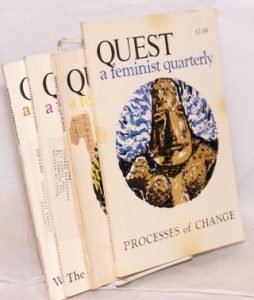In the 1975 winter edition of Quest, there is an advertisement for Working Papers, a radical left wing publication that advocates for fighting injustices and representing underrepresented voices. It just so happens that in 1976, Working Papers released the following image that is on this post. With the summer 1976 release of Working Papers, the cover reads, “Socialism in One City.” It is clear that while Quest did not advertise exclusively for socialism, they are advertising a publication that is willing to fight and advertise for it.

Just to try and digest the timeline: first comes the Cosmopolitan cigarette advertisement, second comes Jan Clausen with Nellie Wong’s socialist poetry, and thirdly another example of socialist advertisements with Working Papers. At the moment, it’s just a list. What I hope to show with this evolving timeline is that so far, there is an immense difference in substance and theme between mainstream publications and feminist publications. The inclusion of Working Papers works in the same dynamic in which Jan Clausen’s kind words do for Nellie Wong; both instances of inclusion foster support for how a non-capitalistic structured publication can viably function without going bankrupt- the support from dedicated readers!
Jan Clausen is a dedicated reader and supporter of Quest and the second wave of feminism respectively. Her analysis of Wong’s work serves as an advertisement for Quest readers to buy like minded work from a like minded individual. When you consider big alcohol and cigarette companies that advertise in Cosmopolitan and Playboy, as seen from their actions, they are going to advertise what can make them the most money from the biggest spending companies. We don’t know what they stand for. Do they stand for nice golf clubs and extravagant alcohols? Can you even stand for that? Feminist publishers are making an extremely clear and conscious effort to advertise products that only reflect the message they are trying to share with the world. The readers can see that Quest cares about underrepresented voices in the community. And when you look at what is being advertised by Quest their advertisements deal with underrepresented voices such as black women in prison, women with mental illness, women in high education, etc- the advertisements are perfectly aligned with the greater message of Quest. The same cannot be said for Playboy or Cosmopolitan, when the reader sees advertisements that are from the biggest companies trying to sell products that are detrimental to the health of the user: cigarettes, alcohol, etc, the greater message of the mainstream publications become confusing. What seems clear is that the mainstream publications are advertising whatever will make them the most amount of money and feminist periodicals are not willing to stoop that low to make ends meet.
So if this assumption is fair to stand by that big name companies gave more money than small feminist poetry books, how did feminist publications stay in business if they decided to stay away from capitalist money and rely on other feminist writers to finance their periodicals?

